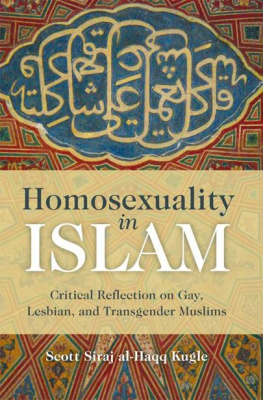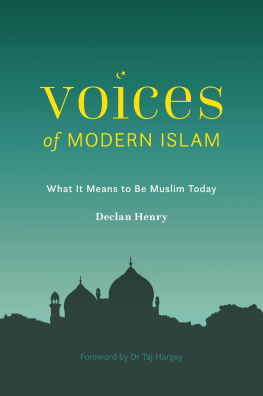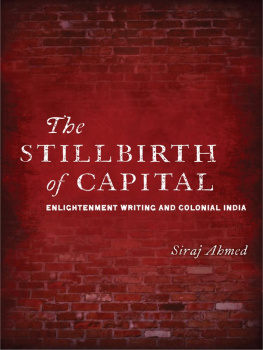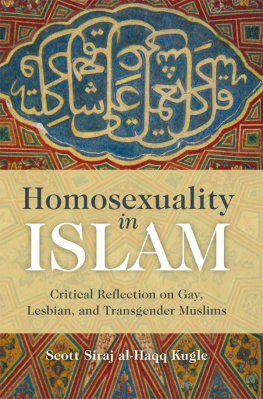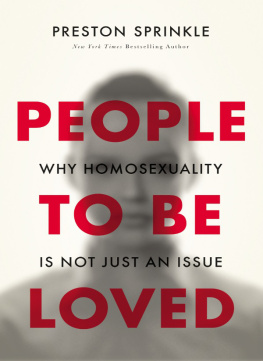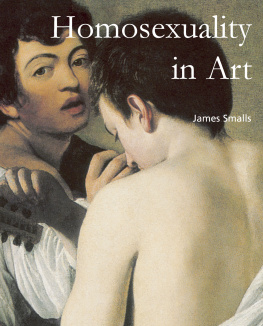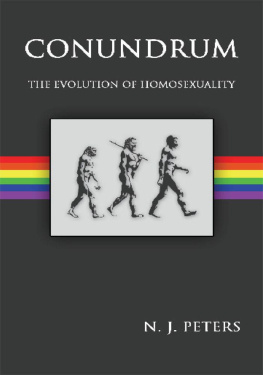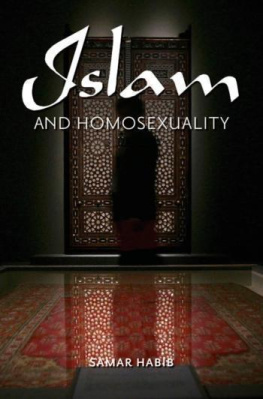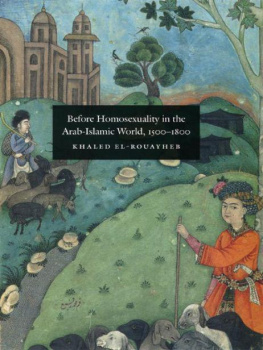Scott Siraj al-Haqq Kugle - Homosexuality in Islam
Here you can read online Scott Siraj al-Haqq Kugle - Homosexuality in Islam full text of the book (entire story) in english for free. Download pdf and epub, get meaning, cover and reviews about this ebook. year: 2011, publisher: Oneworld Publications, genre: Religion. Description of the work, (preface) as well as reviews are available. Best literature library LitArk.com created for fans of good reading and offers a wide selection of genres:
Romance novel
Science fiction
Adventure
Detective
Science
History
Home and family
Prose
Art
Politics
Computer
Non-fiction
Religion
Business
Children
Humor
Choose a favorite category and find really read worthwhile books. Enjoy immersion in the world of imagination, feel the emotions of the characters or learn something new for yourself, make an fascinating discovery.
- Book:Homosexuality in Islam
- Author:
- Publisher:Oneworld Publications
- Genre:
- Year:2011
- Rating:4 / 5
- Favourites:Add to favourites
- Your mark:
- 80
- 1
- 2
- 3
- 4
- 5
Homosexuality in Islam: summary, description and annotation
We offer to read an annotation, description, summary or preface (depends on what the author of the book "Homosexuality in Islam" wrote himself). If you haven't found the necessary information about the book — write in the comments, we will try to find it.
Homosexuality in Islam — read online for free the complete book (whole text) full work
Below is the text of the book, divided by pages. System saving the place of the last page read, allows you to conveniently read the book "Homosexuality in Islam" online for free, without having to search again every time where you left off. Put a bookmark, and you can go to the page where you finished reading at any time.
Font size:
Interval:
Bookmark:


This ebook edition published by Oneworld Publications 2011
Copyright under Berne Convention
A CIP record for this title is available
from the British Library
Cover design by Design Deluxe
185 Banbury Road
Oxford OX2 7AR
England
Bismillah al-rahman al-rahim In the name of God, the compassionate One, the One who cares.
All praise belongs to God, the singular and subtle One, who created the universe and made humankind reflect its diversity. All thanks be to God, who made from one human being two, and from two made many and declared, we created you all from a male and female and made you into different communities and different tribes. Glory be to God who made a multitude in which each is unique and urged them to reflect upon their differences, overcome their egoistic judgment of others, and find the good in each reflected in others so that you should come to know one another, acknowledging that the most noble among you is the one most aware of God (Quran [Q.] 49:13). Then to God they are called and all return. So let us each revere that God, the forbearing One, the One who is just.
Muslim communities, like all other religious groups, face the challenge of confronting diversity. Like other groups, Muslims hesitate and stumble sometimes inflicting violence along the way before dealing justly with people in their diverse ranks who are different in appearance, language, ethnicity, creed, or bodily ability. Among the diverse ranks of people are some who are different in gender identity or sexual orientation. Such people are always a small minority yet they appear in every culture and religious community. This book is about the challenge before contemporary Muslims to acknowledge, understand, and accept the diversity in their midst, especially with respect to sexual orientation and gender identity. It contributes to the ongoing process of meeting that challenge and urges Muslims actively to reconsider prejudgments they may hold about gay, lesbian, or transgender members of their communities.
This book invokes that long tradition of tolerance within the faith which is often ignored or lost in contemporary Muslim communities in searching for a faith-based response to gay, lesbian, and transgender Muslims.
For many Muslims, dealing with homosexuality or transgender issues is a matter of sin and heresy, not difference and diversity. But when pressed, such Muslims often have no clear idea of what homosexuality means, or simply deny that there are any homosexual people in Muslim families and communities. But there are Muslims who face issues squarely with open minds and humble hearts; they may read this book and grapple with the issues it raises. Even if this book does not convince them, it may encourage them to see the issues in a new light, and in that sense it will have succeeded.
Why talk about gay, lesbian, and transgender Muslims now? We must talk about them because they exist and are suffering and are increasingly refusing to bear suppression in silence. Some turn to their religious tradition with faithfilled criticism, seeing it as not merely part of the problem but as essential to possible solutions. This book is based upon the experiences and hopes of those who are not content to wait for their Muslim sisters and brothers gradually to come to tolerate them. It offers theological reflection on the insights arising from lesbian, transgender, and gay Muslims efforts to build support groups to help them reconcile their sexual orientation and gender identity with the Islamic faith. Their struggle beckons Muslims to pay attention to this minority communitys experiences and insights before dismissing them or opposing them.
In that spirit and hope, I offer this book to the public. In the end, only God knows best. I seek protection with God, the One who opens possibilities (al-fattah), the loving One (al-wadud), the One with subtle grace (al-latif).
This book presents my own theological reflections, but it is built upon the experience of many others who have shared their knowledge and wisdom and resources with me. I cannot begin without offering them acknowledgement and gratitude.
This book was written under the auspices of a two-year fellowship from the Institute for the Study of Islam in the Modern World (I.S.I.M.) at the University of Leiden. I am grateful for the Institutes intellectual and financial support for this project, and for those who helped me refine my project, especially Khalid Masud, Asef Bayat, Martin van Bruinessen, and Abdulkader Tayob. I acknowledge with many thanks the scholars and institutions that invited me to address their members and field questions on this issue, such as Linda Herrera at the Institute for the Social Sciences in The Hague, Kamran Ali and Hina Azam at the University of Texas at Austin, and Malek Moazzam Doulat at Occidental College in Los Angeles.
I am especially grateful to my students on the course Gender and Sexuality in Islamic Societies, offered at Swarthmore College and the University of Cape Town, whose questions helped me frame this study. The book began with an article written while I was teaching at Swarthmore College, an institution that has supported and nourished my growth as an intellectual attentive to ethical and political questions. I am grateful to faculty members at Swarthmore especially Pieter Judson, Farha Ghannam, Steven Hopkins, Mark Wallace, and Pallabi Chakravorty who offered me friendship infused with the quest for knowledge.
I have been blessed with the opportunity to learn at the feet of able scholars in many countries, both Muslims who are dedicated to intellectual renewal of their faith and non-Muslims who are deeply knowledgeable about Islam. I cannot As both a Muslim interpreter of the Quran and as a political ally in the fight against injustice, Wadud has offered this book energy and support for which I am deeply grateful.
I have also been blessed with parents who shielded me from poverty, pushed me always to strive for the truth no matter how dangerous that path may be, and supported me in studying, researching, and writing, even if destiny has taken me beyond the horizons of their own experience. While traveling over those horizons, I have found many friends, comrades, and loved ones. I offer sincerest thanks to my sisters of the heart Rukhsana, Rubina, Farah, Bushra, and Sadiyya who have shown me the true meaning of trust, sincerity, and love. Many friends have shared their own discoveries in research into the topic, and I am grateful to Jamal Bakeer, Faris Malik, Daayiee Abdullah, Rusmir Musi , and Nicholas Heer for their their knowledge and experience. I thank Sameer Ashar, Brett Summers, David Anthony, and Kimee Kimura for their unconditional friendship. My thanks and admiration also goes to those whose courage to speak has shaped this book those few whose interviews are quoted here and the many others who are not quoted, along with all of those who shared their experiences with me, urged me to write, and helped me find the strength to do so.
, and Nicholas Heer for their their knowledge and experience. I thank Sameer Ashar, Brett Summers, David Anthony, and Kimee Kimura for their unconditional friendship. My thanks and admiration also goes to those whose courage to speak has shaped this book those few whose interviews are quoted here and the many others who are not quoted, along with all of those who shared their experiences with me, urged me to write, and helped me find the strength to do so.
Font size:
Interval:
Bookmark:
Similar books «Homosexuality in Islam»
Look at similar books to Homosexuality in Islam. We have selected literature similar in name and meaning in the hope of providing readers with more options to find new, interesting, not yet read works.
Discussion, reviews of the book Homosexuality in Islam and just readers' own opinions. Leave your comments, write what you think about the work, its meaning or the main characters. Specify what exactly you liked and what you didn't like, and why you think so.

